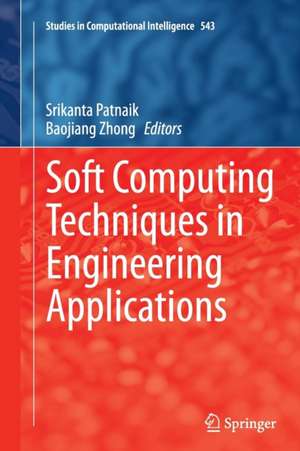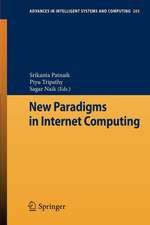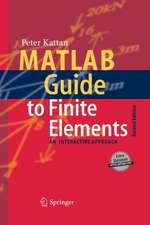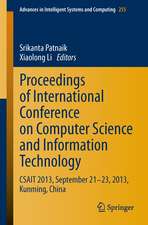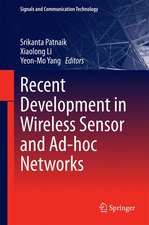Soft Computing Techniques in Engineering Applications: Studies in Computational Intelligence, cartea 543
Editat de Srikanta Patnaik, Baojiang Zhongen Limba Engleză Paperback – 3 sep 2016
| Toate formatele și edițiile | Preț | Express |
|---|---|---|
| Paperback (1) | 641.34 lei 6-8 săpt. | |
| Springer International Publishing – 3 sep 2016 | 641.34 lei 6-8 săpt. | |
| Hardback (1) | 646.30 lei 6-8 săpt. | |
| Springer International Publishing – 10 mar 2014 | 646.30 lei 6-8 săpt. |
Din seria Studies in Computational Intelligence
- 20%
 Preț: 449.37 lei
Preț: 449.37 lei - 20%
 Preț: 1158.26 lei
Preț: 1158.26 lei - 20%
 Preț: 986.66 lei
Preț: 986.66 lei - 20%
 Preț: 1452.76 lei
Preț: 1452.76 lei - 20%
 Preț: 168.78 lei
Preț: 168.78 lei - 20%
 Preț: 1291.10 lei
Preț: 1291.10 lei - 18%
 Preț: 1112.30 lei
Preț: 1112.30 lei - 20%
 Preț: 565.39 lei
Preț: 565.39 lei - 20%
 Preț: 649.28 lei
Preț: 649.28 lei - 20%
 Preț: 1047.73 lei
Preț: 1047.73 lei - 20%
 Preț: 1578.96 lei
Preț: 1578.96 lei - 20%
 Preț: 643.50 lei
Preț: 643.50 lei - 20%
 Preț: 657.49 lei
Preț: 657.49 lei - 20%
 Preț: 993.28 lei
Preț: 993.28 lei - 20%
 Preț: 990.80 lei
Preț: 990.80 lei - 20%
 Preț: 989.96 lei
Preț: 989.96 lei - 20%
 Preț: 1165.69 lei
Preț: 1165.69 lei - 20%
 Preț: 1444.52 lei
Preț: 1444.52 lei - 20%
 Preț: 1041.96 lei
Preț: 1041.96 lei - 20%
 Preț: 1047.73 lei
Preț: 1047.73 lei - 20%
 Preț: 1046.06 lei
Preț: 1046.06 lei - 18%
 Preț: 2500.50 lei
Preț: 2500.50 lei - 20%
 Preț: 989.13 lei
Preț: 989.13 lei - 20%
 Preț: 1165.69 lei
Preț: 1165.69 lei - 20%
 Preț: 1164.05 lei
Preț: 1164.05 lei - 20%
 Preț: 1042.79 lei
Preț: 1042.79 lei - 20%
 Preț: 1460.19 lei
Preț: 1460.19 lei - 18%
 Preț: 1403.52 lei
Preț: 1403.52 lei - 18%
 Preț: 1124.92 lei
Preț: 1124.92 lei - 20%
 Preț: 1039.47 lei
Preț: 1039.47 lei - 20%
 Preț: 1008.11 lei
Preț: 1008.11 lei - 20%
 Preț: 1045.25 lei
Preț: 1045.25 lei - 20%
 Preț: 1275.42 lei
Preț: 1275.42 lei - 20%
 Preț: 1040.32 lei
Preț: 1040.32 lei - 20%
 Preț: 988.32 lei
Preț: 988.32 lei - 20%
 Preț: 1169.79 lei
Preț: 1169.79 lei - 20%
 Preț: 1162.37 lei
Preț: 1162.37 lei - 20%
 Preț: 1059.26 lei
Preț: 1059.26 lei - 20%
 Preț: 1164.05 lei
Preț: 1164.05 lei - 20%
 Preț: 1166.52 lei
Preț: 1166.52 lei - 20%
 Preț: 1459.38 lei
Preț: 1459.38 lei - 18%
 Preț: 1005.74 lei
Preț: 1005.74 lei - 20%
 Preț: 997.38 lei
Preț: 997.38 lei - 20%
 Preț: 1055.94 lei
Preț: 1055.94 lei - 20%
 Preț: 1284.47 lei
Preț: 1284.47 lei - 20%
 Preț: 994.08 lei
Preț: 994.08 lei - 20%
 Preț: 1048.72 lei
Preț: 1048.72 lei - 20%
 Preț: 1066.02 lei
Preț: 1066.02 lei - 20%
 Preț: 943.78 lei
Preț: 943.78 lei - 20%
 Preț: 1173.10 lei
Preț: 1173.10 lei
Preț: 641.34 lei
Preț vechi: 801.68 lei
-20% Nou
Puncte Express: 962
Preț estimativ în valută:
122.76€ • 133.39$ • 103.18£
122.76€ • 133.39$ • 103.18£
Carte tipărită la comandă
Livrare economică 21 aprilie-05 mai
Preluare comenzi: 021 569.72.76
Specificații
ISBN-13: 9783319375014
ISBN-10: 3319375016
Pagini: 212
Ilustrații: VI, 206 p. 134 illus., 57 illus. in color.
Dimensiuni: 155 x 235 x 11 mm
Greutate: 0.3 kg
Ediția:Softcover reprint of the original 1st ed. 2014
Editura: Springer International Publishing
Colecția Springer
Seria Studies in Computational Intelligence
Locul publicării:Cham, Switzerland
ISBN-10: 3319375016
Pagini: 212
Ilustrații: VI, 206 p. 134 illus., 57 illus. in color.
Dimensiuni: 155 x 235 x 11 mm
Greutate: 0.3 kg
Ediția:Softcover reprint of the original 1st ed. 2014
Editura: Springer International Publishing
Colecția Springer
Seria Studies in Computational Intelligence
Locul publicării:Cham, Switzerland
Cuprins
From the Contents: Machine Vision Solutions in Automotive Industry Kinect Quality Enhancement for Triangular Mesh Reconstruction with a Medical Image Application.- Matlab GUI Package for Comparing Data Clustering Algorithms.- Multi Objective Line Symmetry Based Evolutionary Clustering Approach.- An Efficient Method for Contrast Enhancement of Digital Mammographic Images.- Simulation of Obstacle Detection and Speed Control for Autonomous Robotic Vehicle.- A Review of Global Path Planning Algorithms for Planar Navigation of Autonomous Underwater Robots.
Recenzii
From the book reviews:
“This book is a collection of recent applications of soft computing in medical imaging, the automotive industry, and robotics. … the book can be used as reference textbook to give beginners an idea of how to apply soft computing algorithms to practical applications.” (Jindong Liu, Computing Reviews, June, 2014)
“This book is a collection of recent applications of soft computing in medical imaging, the automotive industry, and robotics. … the book can be used as reference textbook to give beginners an idea of how to apply soft computing algorithms to practical applications.” (Jindong Liu, Computing Reviews, June, 2014)
Textul de pe ultima copertă
The Soft Computing techniques, which are based on the information processing of biological systems are now massively used in the area of pattern recognition, making prediction & planning, as well as acting on the environment. Ideally speaking, soft computing is not a subject of homogeneous concepts and techniques; rather, it is an amalgamation of distinct methods that confirms to its guiding principle. At present, the main aim of soft computing is to exploit the tolerance for imprecision and uncertainty to achieve tractability, robustness and low solutions cost. The principal constituents of soft computing techniques are probabilistic reasoning, fuzzy logic, neuro-computing, genetic algorithms, belief networks, chaotic systems, as well as learning theory. This book covers contributions from various authors to demonstrate the use of soft computing techniques in various applications of engineering.
Caracteristici
Latest research on Soft Computing Techniques in Vision Science Presents basic research extending to Visual Perception and Visual system, Cognitive Psychology, and Psychophysics Written by experts in the field Includes supplementary material: sn.pub/extras
